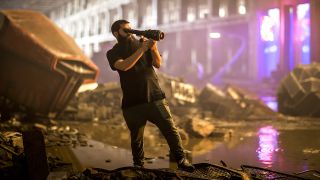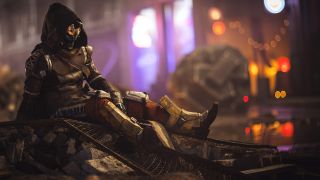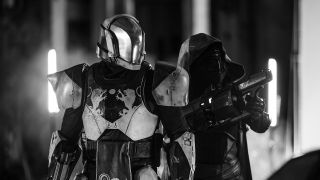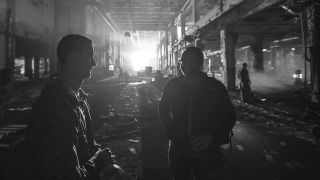"F**k yeah, that's my Destiny": Jordan Vogt-Roberts talks live-action Cayde-6 and the Metal Gear movie
When Bungie decided to make a live-action trailer to celebrate the launch of Destiny 2, it called blockbuster director Jordan Vogt-Roberts. He's fresh from proving he knows how to handle a massive story - both figuratively and literally - on Kong: Skull Island, and his respect and love for games runs so deep it seems like it's carved into his bones.
That's not hyperbole: he has an understanding of the history of games that verges on academic and a drive to share it whenever he can. After finding success with his first movie The Kings Of Summer, Vogt-Roberts fought, hard, to make Metal Gear Solid his next project. Really hard. Like 'wrote an actual book about it to convince the studio' hard. If the Beastie Boys soundtrack and on-point visuals of the Destiny 2 short are any indication, whatever he does with Metal Gear is going to be unmissable.
We spoke to him on the phone about bringing Destiny 2 to the streets of Detroit, progress on the Metal Gear movie, and trying not to freak out when he's hanging out with Hideo Kojima.

When did you decide to sign up for the Destiny 2 live-action trailer?
Jordan Vogt-Roberts: Ironically, I thought the first thing I'd do after Kong would be a very small non-visual thing, like improv, with actors that I had worked with before on a TV show. I thought it was going to be a very casual reentry into making movies and film things that didn't involve monkeys, but I got thrust into a crazy visual effects pipeline and incredibly detailed Destiny suits of armor. It definitely was not the first thing I was expecting to do post Kong, but it's been great.
Was Destiny something that you were familiar with?
I was obsessed with reading the journalism and blogging that came out of the first round of Destiny. As people started figuring out what the game was, or figuring out what they found satisfying, what they found themselves addicted to as each of the raids came out, it was just a game that regularly I found myself reading about. Whether it was just comical articles written about loot caves or whatever.
It filled a pretty weird void in my life, and I was kind of trying to take it easy post Kong and this job came up and Joseph Kosinski - who did Tron: Legacy and Oblivion - had done the previous campaign, so there was a lot of pedigree to it. And I just loved the idea of doing something with Bungie, with Activision, in a game world. Being able to do some of the stuff that I've been talking about with Metal Gear, really diving into a world.
"I was obsessed with reading the journalism and blogging that came out of the first round of Destiny"
Jordan Vogt-Roberts
Metal Gear is something you know very well and you immersed yourself in the material. Did you do the same kind of thing with Destiny?
Absolutely, though I didn't create a 90-page book like we did with Metal Gear. It's so easy to feel like something you love is being sold to someone other than you, and so doesn't represent what you love about the game. I really give Activision credit because that's something that I was really loud about: let's make sure that everyone knows about this game and it's splashy and big and it makes an impact, but let's not ever sell the core audience short. They really understand that and are really respectful of that.
Sign up to the GamesRadar+ Newsletter
Weekly digests, tales from the communities you love, and more
I went up to Bungie for a day and just sat in the screening room with all the different department heads and really just flew through the worlds. Played some of it with them, talked about the characters, talked about the mechanics, talked about the design influences and really just tried to do a huge deep dive. It was so great to talk to everyone at Bungie and really let them know that it's important to me to translate this stuff and to get it right. It was just a dream to be able to be up there with these legends of the gaming industry. You can see how much they care about it.
This is Ken Seng. A friend & collaborator. He shot a little film called DEADPOOL. He also shot my project that drops tomorrow :) Get ready. pic.twitter.com/fd1Tlu9q4JAugust 30, 2017
Talk to me a bit about choosing Detroit as the setting.
There's a bunch of different ways that you can do something like this. There's a world where most of the stuff could be shot on a stage and on green screen. Like with Kong, I wanted to be in as many real locations as possible, I really wanted the spot to feel tactile and real. One of the things I put in my treatment was saying, I want to go to Detroit and whether it's our last city or in the EDZ, I want to find places there, old warehouses, old factories, old abandoned churches, old abandoned theaters, things like that, that have that grit and that reality to them.
I'm from Michigan, so I have an obvious love for Detroit, but it just so beautifully worked for what this is. You're taking these immaculate suits that are built by Legacy, the people who built the Iron Man suits, and you're plopping them in a real environment in Detroit, then so much of your work has been done for you and you build on top of that.
Does working on projects like this give you any kind of brainstorms or future ideas for Metal Gear?
Absolutely. I realized for myself of what a mission and passion it is to figure out how we change the conversation about games and film as a whole, something like this is absolutely just another step - another experiment - in translating elements of the active experience of playing a game into the passive experience of watching something.
What things translate really well, what things don't, where you do have to take creative freedoms aesthetically, where you actually can just double down and say "No, that's what it looks like, and that's what it's supposed to look like. Let's do it." It's all a perpetual slow burn building up to Metal Gear, and hopefully [it helps] with other directors rewriting the conversation of how people look at games in a cinematic way.

How are you feeling about the Metal Gear project right now?
I'm always going to be nervous, because to me, the same way I was playing with Kong, which is film history, Metal Gear is video game history. I'm super excited right now because we were able to go in - with the success of Kong and 'edgier' movies like Deadpool and Logan - and say, "You know what, guys? I know we've been going down a certain path with this movie, but let's rethink this and make sure that we're doing the absolute coolest, 'most true to Kojima's voice' version of this movie."
I really give credit to our execs at Sony and our producers for really backing me on this, saying, let's make the version of this movie that succeeds because it's different, because it's weird, because it is Kojima. Understand that those things are important to this franchise, that the intensity and the aesthetic coolness of the franchise is one element, and there's an inherent goofiness and a weirdness and a Japanese quality; let's not be afraid of that stuff.
I feel great about the approach we're taking right now, but these things take forever; we need to nail this script, and we need to have the studio truly say it's a movie that they want to make and cast it. Making a movie is a process where for several years, you have a series of events where everything will present itself in a way to try and make the movie bad. It's this crazy thing where you have to navigate death by a thousand paper cuts, or getting eaten by a million ducks.
That's nightmarish.
I think people understand - through my relationship with Kojima and otherwise - that we're really trying to shepherd this in the most interesting ways. There's about a million steps to take and about a million things that can go wrong in the process, but I'm excited because the intent is right, the approach is right. The ethos and the producers and the executives, we all have the best interest right now in mind.
"Metal Gear is video game history"
Jordan Vogt-Roberts
Are you ever a little freaked out, getting to go to lunch with Kojima, interviewing him on stage at E3?
Absolutely. I asked Kojima that during our E3 talk, where I was like, "Look, you've become a friend and a colleague - but there will always be this part of me that's fucking freaking out, like oh my God, oh my God". I put it in terms of, he had just sat down with George Miller and he loves Mad Max and those movies so much, and I was like "So when you sit down with him, are you sitting down as a friend and a colleague? Or are you sitting down like I am right now, where there's this fucking little kid in you freaking out?" Kojima was like, "No, I was freaking out."
It's such an interesting thing to reconcile that Metal Gear Solid is about to be 20 years old. It's crazy to think about that, and crazy to think about the time in which Kojima's work has influenced my life. And that's just Metal Gear Solid; we're not even talking about Metal Gear. That talk was just so important to me, because I just wanted people to glimpse what I've been able to see in him - the way his brain works and his love of cinema, and his knowledge of it and his ability to do what I think very few people can do. [He can] talk about things on a highly intellectual and highly emotional creative level at the same time.
I think people who have seen you talk about it know it's in safe hands, can see how much it means to you...
I think people have every right to be skeptical of how these things get made. People could have all the best intentions in the world and still not have movies turn out properly, but I hope that people at least know - and I think that they do now - that the intent, love and approach are all in the right place.

I think the Destiny trailer will give people a chance to see that too.
We worked really slavishly. It's sort of three spots in one, 'cause it's trying to bring people who might not know about Destiny in; [at the same time,] I'm working really hard within that to protect and [capture] the best version of what Destiny is for the people who already love it. To walk that tightrope of trying to reach as many people as possible who may not think about playing a sci-fi shooter or have never heard of Destiny before. And have it be splashy and cool and this brand new thing, but then it has to be something that people who are Bungie fans, Destiny fans - the core players who stay up all night, people who raid - that they can also be proud of it and say, "Fuck yeah, that's my Destiny. That feels like the world that I fell in love with; that feels like the aesthetic that I fell in love with."
It's also a game that breeds this kind of unique cooperative, collaborative feel, rather than an antagonistic one.
There's just a different kind of respect built into it, which is really great. Part of that [comes from] decisions that Bungie made about how people have to opt into voice chat and things like that. It's so interesting getting into the minutiae of it all and talking with their animators, talking with their design people, talking with their music people.
I could spend weeks up at Bungie. I can't say enough great things. When you go up to that company, I can't tell you enough how intimate it feels. It doesn't feel like a massive corporation, it doesn't feel like this massive sprawl. You think Bungie, they're huge, they're massive - [but] you go there and it's such a tight personal community of people who are trying to make something great. I can't say enough great things about them.

The game's creators, like Luke Smith, seem as much into the world of Destiny as any fan.
You don't get the vibe that anyone is up there for a paycheck.[It made me feel the same way I did] coming out of a cardboard box onstage with Kojima. [It's like a] 'is this really what's happening in my life?' kind of moment. No shooters feel like Bungie shooters. They have such a specific quality that people almost can't imitate. Being able to pick their brains on a very nerdy mechanics level of what the gameplay is doing, how much space you're traversing, how quickly you turn around or accelerate.
I really could have spent an unlimited amount of time just picking their brains. I think they would've been like, "Jordan, get out of our fucking office. We have a game to ship right now."
What are you doing after this?
We're about to hopefully get our new writer hired on Metal Gear, so that's going to be a really deep dive. I'm pretty sure we're going to go lock ourselves in a room for a weekend and watch every Metal Gear cutscene that ever existed and talk about it, so that should be pretty interesting (and probably smelly).
Like a Metal Gear hazing.
He's a Metal Gear fan himself, but it's going to be that same feeling as when me and my friends used to have LAN parties, or when I modded my Dreamcast back in the day. My mom walking into the room and you think the room smells fine - then someone else walks in it and they're like "Oh my God, it stinks in here." I think that's probably what that process is going to be like. I just want everything to be something that I am excited about and care about. I can't take a job just for the sake of taking a job.
The interview has been edited and condensed for clarity.
Photo credits: Chase Madrid

Rachel Weber is the US Managing Editor of GamesRadar+ and lives in Brooklyn, New York. She joined GamesRadar+ in 2017, revitalizing the news coverage and building new processes and strategies for the US team.

After designing a Helldivers 2 Assault mission pitch "crazy similar" to one Arrowhead kicked around, fan returns with another concept that takes you right into the lair of the bugs

Director of upcoming Evil Dead spin-off teases the horror movie - "crazy, lots of Deadites, a big statement"

The Fallout TV show finally corrects my big game frustration: giving romance the focus it deserves
Most Popular




